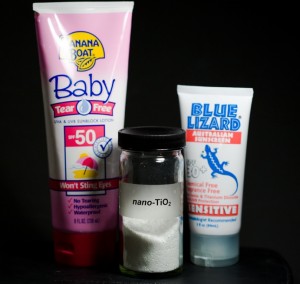Nanoparticles are already used in many sunscreens.(Photo: Alex Parlini, Proj. on Emerging Nanotechnologies)One month ago, the Committee on Environment, Health and Consumer Protection of the European Parliament voted in favor of excluding nanotechnology from the EU list of novel foods allowed on the market. This committee vote represents one of the first times ever that a legislative body has weighed in on the issue of nanotech particles in food. (Nanotechnology refers to materials or devices developed on an atomic or molecular scale, sized between 1 to 100 nanometers — basically, really, really, really tiny novel particles that our skin and other organs have never before encountered at this scale.)
For those of us watching how government views nanotechnology, this was welcome news.
Whether we are focusing on food or other consumer goods, so far more than a thousand products containing nanoparticles are currently available in the U.S. These nano-enabled products have been put on the market without testing their possible impacts on human health or the environment. And, without stringent government review and without regulation, these products are foisted on a... Read more

